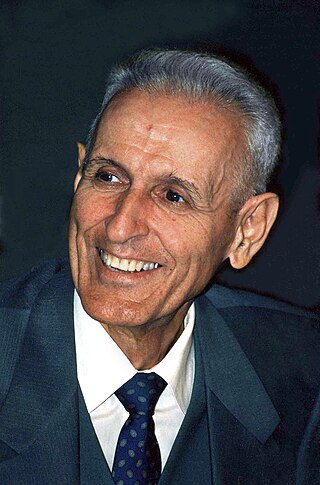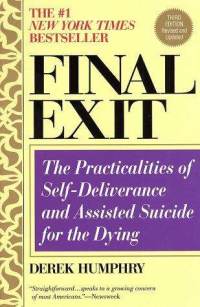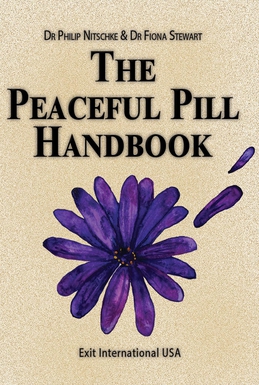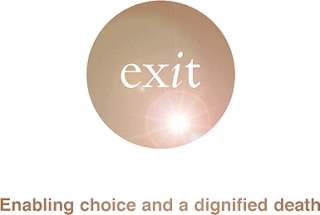Euthanasia is the practice of intentionally ending life to eliminate pain and suffering.

Murad Jacob "Jack" Kevorkian was an American pathologist and euthanasia proponent. He publicly championed a terminal patient's right to die by physician-assisted suicide, embodied in his quote, "Dying is not a crime". Kevorkian said that he assisted at least 130 patients to that end. He was convicted of murder in 1999 and was often portrayed in the media with the name of "Dr. Death".
Compassion & Choices is a nonprofit organization in the United States working to improve patient autonomy and individual choice at the end of life, including access to medical aid in dying. Its primary function is advocating for and ensuring access to aid in dying.

Final Exit: The Practicalities of Self-Deliverance and Assisted Suicide for the Dying, often shortened to just Final Exit, is a 1991 book written by Derek Humphry, a British-born American journalist, author, and assisted suicide advocate who co-founded the now-defunct Hemlock Society in 1980 and co-founded the Final Exit Network in 2004. The book was first published in 1991 by the Hemlock Society US in hardback. The following year, its 2nd edition was published by Dell in trade paperback. The current updated edition was published in 2010.
Voluntary euthanasia is the ending of a person's life at their request in order to relieve them of suffering. Voluntary euthanasia and physician-assisted suicide (PAS) have been the focus of intense debate in recent years. Some forms of voluntary euthanasia are legal in Australia, Belgium, Canada, Colombia, Luxembourg, the Netherlands, New Zealand, and Spain.
The Hemlock Society was an American right-to-die and assisted suicide advocacy organization which existed from 1980 to 2003, who took its name from Conium maculatum, a highly poisonous biennial herbaceous flowering plant in the carrot family, as a direct reference to the method by which the Athenian philosopher Socrates took his life in 399 BC, as described in Plato's Phaedo.
The World Federation of Right to Die Societies is an international federation of associations that promote access to voluntary euthanasia. It holds regular international meetings on dying and death.
Final Exit Network, Inc. (FEN) is an American 501(c)(3) nonprofit right to die advocacy group incorporated under Florida law. It holds that mentally competent adults who suffer from a terminal illness, intractable pain, or irreversible physical conditions have a right to voluntarily end their lives. In cases deemed valid, Final Exit Network arranges what it refers to as "self deliverances". Typically, the network assigns two "exit guides" to a client and are present when they die, but the network states, and has proven in court, that it does not provide physical assistance in anyone's death; rather, their role is that of compassionate advisors and witnesses.
The International Task Force on Euthanasia and Assisted Suicide is a 501(c)(3) non-profit educational organization that concerns itself with the issues of euthanasia, doctor-prescribed suicide, advance directives, assisted suicide proposals, "right-to-die" cases, disability rights, pain control, and related bioethical issues. They oppose the legalization of euthanasia. The executive director of the Task Force is lawyer Rita Marker, author of Deadly Compassion: The Death of Ann Humphry and the Truth About Euthanasia, which puts forth an account of the death of the wife of euthanasia advocate Derek Humphry. In January 2011, The International Task Force changed its name to The Patients Rights Council.

Dignity in Dying is a United Kingdom nationwide campaigning organisation. It is funded by voluntary contributions from members of the public, and as of December 2010, it claimed to have 25,000 actively subscribing supporters. The organisation declares it is independent of any political, religious or other affiliations, and has the stated primary aim of campaigning for individuals to have greater choice and more control over end-of-life decisions, so as to alleviate any suffering they may be undergoing as they near the end of their life.

Dignitas is a Swiss nonprofit organization providing physician-assisted suicide to members with terminal illness or severe physical or mental illness, supported by independent Swiss doctors. By the end of 2020, they had assisted 3,248 people with suicide at home within Switzerland and at Dignitas' house/flat near Zürich. They provide advisory work on palliative care, health care advance directives, suicide attempt prevention, and legislation for right-to-die laws around the world.

The Peaceful Pill Handbook is a book that provides information on assisted suicide and voluntary euthanasia. Written by the Australian doctor Philip Nitschke and lawyer Fiona Stewart, it was originally published in the U.S. in 2006. A German edition of the print book—Die Friedliche Pille—was published in 2011. A French edition—La Pilule Paisible—was published in June 2015. An Italian edition—La pillola della quiete—was published in 2018.
A euthanasia device is a machine engineered to allow an individual to die quickly with minimal pain. The most common devices are those designed to help terminally ill people die by voluntary euthanasia or assisted suicide without prolonged pain. They may be operated by a second party, such as a physician, or by the person wishing to die. There is an ongoing debate on the ethics of euthanasia and the use of euthanasia devices.
Euthanasia became legal in New Zealand when the End of Life Choice Act 2019 took full effect on 7 November 2021. It is illegal to "aid and abet suicide" under Section 179 of the New Zealand Crimes Act 1961. The clauses of this act make it an offence to "incite, procure or counsel" and "aid and abet" someone else to commit suicide, regardless of whether a suicide attempt is made or not. Section 179 covers both coercion to undertake assisted suicide and true suicide, such as that caused by bullying. This will not change under the End of Life Choices Act 2019, which has provisions on coercion of terminally ill people.

Arthur Koestler: The Story of a Friendship is a book by George Mikes published in 1983, soon after Arthur Koestler’s suicide. As the author states in the Introduction, the book is not a biography of the subject but a series of recollections and anecdotes of a friendship spanning more than thirty years from 1952 up to the time of Koestler’s suicide in March 1983.
A suicide bag, also known as an exit bag or hood, is part of a euthanasia device consisting of a large plastic bag with a drawcord used to die by suicide through inert gas asphyxiation. It is usually used in conjunction with a flow of an inert gas that is lighter or less dense than air, like helium or nitrogen. Continuing to breathe expels carbon dioxide and this prevents the panic, sense of suffocation and struggling before unconsciousness, known as the hypercapnic alarm response caused by the presence of high carbon dioxide concentrations in the blood. This method also makes the direct cause of death difficult to trace if the bag and gas canister are removed before the death is investigated. While asphyxiation by helium can be detected at autopsy, there is currently no test that can detect asphyxiation by nitrogen. For this reason, nitrogen is commonly the preferred choice for people who do not want the cause of death established.

Jean's Way, a book by Derek Humphry, is an account of Humphry's terminally ill wife's planned suicide from suffering. The book is his first on the issue of voluntary euthanasia and assisted suicide.

Exit is a not-for-profit, pro-euthanasia organisation based in Scotland that lobbies for and provides information about voluntary euthanasia and assisted suicide. It has particularly focused on research and publication of works which provide information about suicide methods, including How to Die With Dignity, the first book published on the subject.
Gerald Alexander Larue was an American scholar of religion and professor emeritus of gerontology, a former ordained minister who became an agnostic, archaeologist, debunker of biblical stories and accounts of miracles, and humanist.








